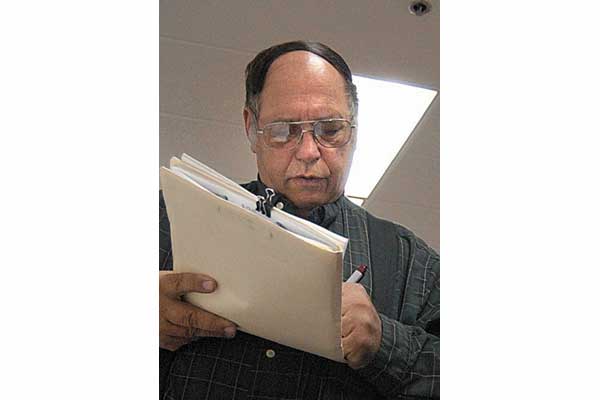A Superior Court commissioner who often ruled in favor of a
father and son team now facing 169 felony charges will not take the
witness stand.
A Superior Court commissioner who often ruled in favor of a father and son team now facing 169 felony charges will not take the witness stand.
The judge presiding over the preliminary hearing of a family accused of fraud, attempted grand theft, perjury and other felonies granted a motion Friday to quash the prosecution’s subpoena summoning Santa Clara County Commissioner Gregory Saldivar as a witness. The four people facing charges are father Vincent Cardinalli Sr., son Paul Greer – formerly Vincent Cardinalli Jr. – daughter Rosemary Ball, and her husband, Michael Ball.
The preliminary hearing will determine if the four stand trial.
Superior Court Judge Gilbert Brown upheld the motion submitted by Saldivar’s attorney because Deputy District Attorney Dale Lohman could not prove the relevance of Saldivar’s testimony, he said. Lohman said she could not do so because the county attorney would not let her speak with Saldivar before the preliminary hearing.
“It’s a Catch-22,” Lohman said outside the courtroom.
Although Lohman would not say what specific questions she had hoped to ask Saldivar on the witness stand, she subpoenaed Saldivar to testify about the hundreds of small claims cases Cardinalli and Greer brought before him.
The family’s charges stem from more than 2,000 small claims lawsuits Cardinalli and Greer filed in San Benito and Santa Clara counties, parlaying their towing businesses into a gold mine, according to court documents. The family brought an avalanche of lawsuits against unwitting motorists for towing, storage and lien sale fees on vehicles they never owned, or had sold years before the cars were towed. When defendants tried to fight back, father and son often zeroed in on technicalities and advanced frivolous arguments, said Greg Adler, an attorney for Copart – an auto auction company that was a target of such lawsuits. Adler was one of the prosecution’s first witnesses.
After fending off three of Greer’s lawsuits, Adler dedicated countless hours of his own time sifting through court documents and uncovered several patterns in the family’s court records. Saldivar’s tendency to rule in favor of Cardinalli and Greer, as well as Cardinalli and Greer’s preference to have cases heard by Saldivar, set off “red flags,” Adler said.
In all but one of the files Adler reviewed, cases that were originally heard by Saldivar but later appealed to the Superior Court by the small claims defendants were overturned by the higher court judges, he said. Other judges and commissioners often ruled in favor of the people that Greer and Cardinalli sued.
“Saldivar is a percipient witness to crimes that occurred in his courtroom, in his presence,” Lohman wrote in her opposition to Saldivar’s attorney’s motion to quash. “Many of the charged crimes occurred in his courtroom, on his watch. His courtroom provided the backdrop and the opportunity for the defendants’ criminal scheme.”
Although Brown quashed Saldivar’s subpoena, his decision will not affect who Lohman calls to take the stand at trial, she said.
Typically, witnesses like to know ahead of time what they’ll be asked, she said. If Saldivar does testify in the trial, “I guess it’s going to be a surprise,” she said.
Saldivar’s attorney, Kimberly Drake, would not comment.
In the same proceedings, Brown ruled against Cardinalli’s subpoena of San Benito Superior Court Judge Harry Tobias, who also presided over some of the towing cases.
Brown also shot down a motion filed by Cardinalli – who is representing himself – that aimed to disqualify Lohman for “threatening” him.
According to Cardinalli’s motion, which was riddled with grammatical and spelling errors, Lohman made false statements regarding a lawsuit Cardinalli filed against two of the prosecution’s witnesses. Cardinalli was in custody and had been declared a vexatious litigant, but still won a $4.5 million default judgment.
“Basically what Mrs. Lohman was telling Vincent Cardinalli to do is seat [sic] in court and say nothing during the Preliminary hearing and put on no defense,” Cardinalli wrote.
Enumerating his points, Cardinalli asserted “that Mrs. Lohman District Attorney’s staff and investigator’s [sic] should be prohibit [sic] from having anything to do with this case from this day forward. Vincent Cardinalli believe’s [sic] this case should be dismiss [sic] with prejudice and not allowed to be refilled [sic],” the motion concluded.
“We all want to make sure we’re not trampling on Mr. Cardinalli’s rights,” Lohman said.
The motions and the judge’s rulings continue what has been a hectic and, at times, disjointed preliminary hearing. Lohman’s succinct question and answer sessions with her witnesses often gave way to awkward exchanges between Cardinalli and the prosecution’s witnesses. Long, tense pauses punctuated only by the loud rustling of papers into Cardinalli’s microphone slowed the flow of the preliminary hearing.
With Saldivar out of the picture for the preliminary hearing, Lohman said she expected to call her last witness – an employee of the court who will testify how Greer and Cardinalli were some of the court’s “biggest customers” – Monday.
The defense will then have the opportunity to call witnesses and Lohman expected to present oral closing arguments in early August, rounding out what was expected to be a six-week preliminary hearing that began May 11. The judge will likely make a decision on whether to hold the case over for trial about a month after closing arguments.








